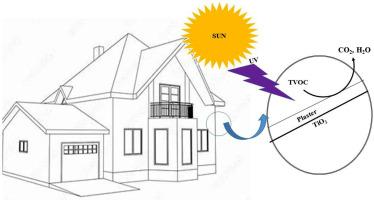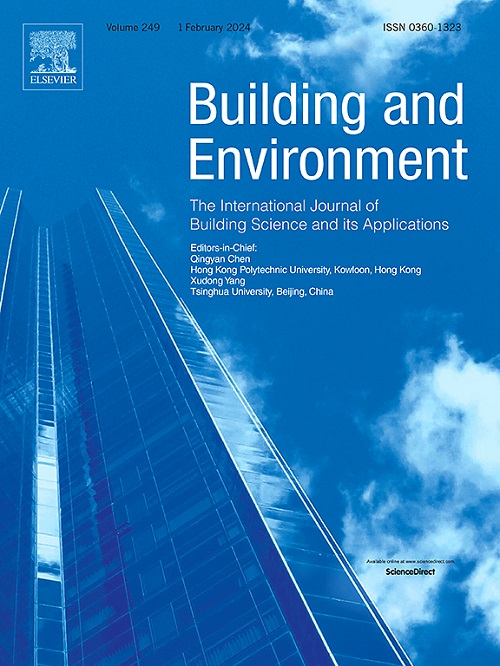Evaluation of photocatalytic efficiency of TiO2 applied over cement plaster for mitigating urban air pollutant: TVOC
IF 7.1
1区 工程技术
Q1 CONSTRUCTION & BUILDING TECHNOLOGY
引用次数: 0
Abstract
Photocatalysis emerged as a prominent method for mitigating air pollution stemming from emissions of total volatile organic compounds (TVOCs) in both indoor and outdoor environments. Given the slow degradation rate of certain TVOCs, which pose health risks, including carcinogenicity, there is a pressing need for effective air purification strategies, particularly within built environments where individuals spend substantial amounts of time. This study delves into the efficacy of TiO2 photocatalysis in reducing air pollutants when applied to building surfaces. Cement mortar samples, incorporating varied doses of TiO2 ranging from 7.83E-03 g/cm2 to 4.92E-02 g/cm2, were prepared and examined within batch reactors, both under sunlight exposure and in the absence thereof, to gauge their degradation rates towards TVOCs. Furthermore, surface characterization techniques were employed to explicate the microstructural properties of TiO2-coated plastered samples. The results obtained demonstrated the variation in the rate of degradation from 1.09E-04±0.1 % to 3.1E-4 ± 1.13 % min−1cm−2 for various initial concentrations of total volatile organic compounds (TVOCs) in the range of 600 ppm to 2900 ppm over a period of 100 min. The selected approach demonstrated the maximum degradation rate constant of 5.2E-04 min−1cm−2 corresponding to 15 % of TiO2 dose by weight of cement. These findings underscore the promise of TiO2 in purifying polluted air and advocate for its widespread implementation on building surfaces to enhance air quality.

评估在水泥抹灰上应用二氧化钛的光催化效率以减少城市空气污染物:TVOC
光催化技术是缓解室内外环境中总挥发性有机化合物(TVOC)排放造成的空气污染的一种重要方法。鉴于某些 TVOC 的降解速度较慢,会对健康造成危害,包括致癌,因此迫切需要有效的空气净化策略,尤其是在个人长时间逗留的建筑环境中。本研究深入探讨了二氧化钛光催化技术在建筑表面应用时减少空气污染物的功效。研究人员制备了水泥砂浆样品,在批量反应器中加入了不同剂量的 TiO2(从 7.83E-03 g/cm2 到 4.92E-02 g/cm2 不等),并在阳光照射和没有阳光照射的情况下对样品进行了检测,以测定其对 TVOC 的降解率。此外,还采用了表面表征技术来解释涂有 TiO2 涂层的灰泥样品的微观结构特性。结果表明,在 100 分钟的时间内,总挥发性有机化合物 (TVOC) 的初始浓度在 600 ppm 到 2900 ppm 之间,降解率从 1.09E-04±0.1 % 到 3.1E-4±1.13 % min-1cm-2 不等。所选方法的最大降解速率常数为 5.2E-04 min-1cm-2,相当于水泥重量中 15% 的二氧化钛剂量。这些发现强调了二氧化钛在净化污染空气方面的前景,并提倡在建筑物表面广泛使用二氧化钛,以提高空气质量。
本文章由计算机程序翻译,如有差异,请以英文原文为准。
求助全文
约1分钟内获得全文
求助全文
来源期刊

Building and Environment
工程技术-工程:环境
CiteScore
12.50
自引率
23.00%
发文量
1130
审稿时长
27 days
期刊介绍:
Building and Environment, an international journal, is dedicated to publishing original research papers, comprehensive review articles, editorials, and short communications in the fields of building science, urban physics, and human interaction with the indoor and outdoor built environment. The journal emphasizes innovative technologies and knowledge verified through measurement and analysis. It covers environmental performance across various spatial scales, from cities and communities to buildings and systems, fostering collaborative, multi-disciplinary research with broader significance.
 求助内容:
求助内容: 应助结果提醒方式:
应助结果提醒方式:


